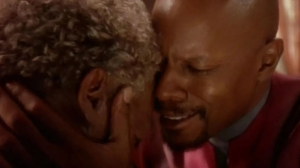The opioid crisis continues to be a lethal epidemic around the world, with the drug war taking countless unnecessary lives year after year. Nicholas Jarecki, the director of Arbitrage, tackles the subject head-on with his new film, Crisis, which is now available on DVD and Digital HD. The movie takes a look at many of the different and complicated sides of the opioid crisis, meshing together multiple narratives that deal with addicts, police, scientists, drug companies, crime organizations, and the FDA.
Videos by ComicBook.com
Crisis follows three main stories: A police officer who is deep undercover with a criminal organization as he tries to stop the influx of opioids in America (all while dealing with addiction in his own family), a scientist who discovers the horrifying dangers of a new drug, and a recovering addict who loses her only son as a result of the ongoing war.
Jarecki’s movie aims to touch all bases related to this epidemic, and bring to life a devastating and authentic tale of this problem that has taken so many lives. He wanted to shed a light on just how deep the issues go, and how many different fingerprints are actually present at the crime, showing that there’s no one person or group to blame when the crisis becomes so large.
The writer/director took some time to chat with ComicBook.com about Crisis, the tragic story that led to the film’s inception, and how he created his complex characters.
Personal Connection
Charlie Ridgely (ComicBook.com): So many people have been affected by opioids, was there a personal connection to the story for you? Was Crisis born out of some kind of personal story?
Nicholas Jarecki: Yeah, indeed, this started from personal experience. About 15 years ago, I had a friend who passed away from opioid abuse. He started off with pain pills, kind of experimentally, and then he got addicted very fast. When you’re buying those pills on the black market, they can get very expensive, and so he burned through a lot of money with that. And then, as I found later, I didn’t understand any of this at the time, he switched over to heroin, because it’s so much cheaper and provides basically the same effect as opioid, oxycodone.
And pretty quickly he was gone. And this was just such a shocker to those of us who were friends with him, because he was late 20s, super bright, had everything going for him, nothing you would expect like this at all. And it was a head-scratcher for those of us who loved him. But it’s a long time ago, and we kind of filed it away in the, what the hell is this, can’t understand the mysteries of life, but it stayed with me, of course, because he was one of my closest friends.
Flash forward, about five years ago, I read this series of investigative articles in the Los Angeles Times. And these brilliant reporters, that I later teamed up with, had gone and unearthed all of this research from inside certain pharmaceutical companies, showing that the companies that were active in the development and promotion of these opioids may have had information that they were far more addictive than anybody knew. I think they used to say, “Oh, one in a hundred people might get addicted if they have a back injury and they take opioids.” But the research showed, the internal research, it might be more like 20 to 50.
And so this was a kind of groundbreaking insight for me, where I said, “Hold on a second, the manufacturers may have known that this product was so intensely powerful that it could create addiction, even in the course of people who took it prescribed from their doctor?” Well, the public certainly didn’t know that, because I didn’t know it. And
so that helped me make a lot of sense of what happened to my friend.
Digging Deeper
As I began to do more investigation, I saw that there was a clear pathway, there were thousands, if not hundreds of thousands, of people who had been prescribed a pill for an injury, a work-related injury, started taking that pill, and because of the way their particular body chemistry worked, they would quickly become dependent. And as they would burn through their 401k or whatever, just like happened to my friend, then they had to turn to the street.
And I thought, “Wow, isn’t that fascinating?” Because I love the corporate thriller. I love Michael Clayton. I love The Insider, all these types of films. And I said, “This is a real-life corporate thriller unfolding before our eyes.”
And we saw, in the last 10 years, these opioid deaths skyrocket. We’ve had morphine in America, they used to give it to civil war soldiers on the battlefield, they didn’t have millions of addicts, so what happened between then and now, where all of a sudden now there are these very powerful opioids, and we’ve got so many people addicted, so many people in trouble?
So as I started to dig more with the reporters, I saw they had spent huge energy marketing these pills and saying, “Oh, these are safe. Don’t worry.” And I felt that the Food and Drug Administration, I don’t know that they really did the job of informing the American public of the risks. So I thought, “Okay, this is bad. This is a fascinating insight, this is the hook.”
Anti-Hero Jake Kelly
I want to talk a little about the character of Jake Kelly. This is an interesting take on the kinds of cops you see in these movies, where he knows the law isn’t doing the right or just thing, but also fails to do the right or just thing in his own life.
Absolutely. It was a very fun character to write, and I think Armie [Hammer] played it quite well. Look, the opioid thing is really big, and it’s powerful, and it killed millions maybe. And what’s behind it, ultimately, is, in all areas of it, a Goliath, whether it’s the pharmaceutical company, or the drug traffickers, or the laziness of our government to fix this, we’re losing. We’re losing the war.
I thought, with this movie, there was something in it … When you make a movie, you look for a theme, so I kept hearing this voice in the back of my head that said, “Sometimes if you want to change the rules, maybe you have to break the rules.” And that was a kind of continuation of something from Arbitrage. A friend of mine had said about Arbitrage, he thought it was, “Character studies of people doing the wrong things for the right reasons.” So that’s all kind of on a line of something I like.
And I really have always loved these movies of the ’70s, the 1970s cinema, where you have out [Al] Pacino in Dog Day Afternoon, or Serpico. Or you’ve got the cinema of Billy Friedkin, The French Connection, and later on, To Live and Die in LA, which is such a wonderful movie about counterfeiting, and it’s a great early Willem Defoe performance.
But you have these grizzled characters, they’re a bit of a trope perhaps, but they’re very satisfying. They are anti-heroes, they are people who walk on the wrong side of the street, they’re fucked up in their personal life, they color outside the lines. They’re willing to cut corners because, ultimately, they’re fighting such a Goliath like thing that they go, “Well, if I were to just do it the “right” way, the okay way, I could never make any progress, so maybe, fuck it, I have to throw out the playbook, and I have to do what feels morally right to me.”
Evangeline Lilly
And then you’ve got Evangeline Lilly playing a recovering addict, and the mother of a teenage boy who died as a result of the opioid crisis. Her character really moves in a different direction than you’d expect, especially in the film’s climax. She’s very much the character you root for, despite the legality of her actions.
As an actress, she said that too, and she was very excited about that. She said, “This is kind of subversive, right? Because in a way we’re advocating this behavior that’s lawless, but what can we do to fight this entrenched evil that we’re confronting?” There are no easy answers to these problems.
So at least in this film, we kind of go from a dark place. I actually didn’t realize, even when I was writing or making the film … I would watch the film, and then some people would see it and go, “Wow, that’s pretty dark.” And it didn’t even really occur to me, until I got some distance from it, that it is a walk through the dark side on this movie. But I agree. When I tested the film, which is not something I would normally do, but audiences were very pleased how it worked out for her character at the end.
Directing Yourself
People may not know, but you starred as Jake’s partner in the movie and you gave yourself some pretty intense scenes.
Well listen, it was a kind of bold decision to appear in the film. I had a little bit of acting experience. You can blame my performance on Lenny Kravitz, he cast me about four years ago in a music video he was making, where he wanted to hire a real director to play a crazy director directing him and having a breakdown. So I shot this music video, Lenny and I, and I just had a great time doing it. I love actors. If I have strengths as a director, my work with the actors is one of them.
Now this came along, and I didn’t write the role for myself, but finally the cast said to me, “Hey, where are we at with casting that partner role?” And for whatever reason, I just said, “Well, hey, I don’t want to do it if it’s not okay with you guys, but I was thinking maybe I would do it.” And I’m thinking people will be like, “Oh, no.” And everyone was just sort of like, “Great. Okay, so you’re in. Okay, you know that, so that’s great. We’re going to play off that.” And I went, “Oh shit, now I’m in the movie. How am I going to do this?”
But I learned such a tremendous amount, it really made me gain even more respect for actors, of how complex it is to manage all of the elements of a performance. As the director, you’re sitting there and being like, “Okay, do it again.” But doing it, you have to balance not only the performance, you have to balance your movement, how you react to the other actor, where the camera is. We’d be doing these walks, and I’m bumping into the steady cam operator. It’s like I never set foot on a set before, I’m like an idiot. Thankfully, as a director, you direct yourself, you have unlimited takes, so that’s one advantage.
But I thought, “If I’m going to do the film, I have to do it as the kind of comic relief character.” You be the judge, but hopefully I add a little bit of a manic energy to it that’s entertaining. I think only Warren Beatty can cast himself as a romantic lead, or Clooney, so I’m staying out of terrain for now. But I loved doing it.
What Comes Next?
With Crisis and your first film, Arbitrage, you’re clearly drawn to the thriller genre. Are you looking do keep that trend going with your next project, or are you hoping to switch things up a bit and move in a different direction?
I would say, again, just going back to the ’70s cinema, I love these characters that are on the edge in some way, that are a bit larger than life. And what I thought with Arbitrage was, with Richard Gere, he played a billionaire whose whole world was collapsing, and we followed him, and he was really at the top of society, and so you got to see the super rich, and the jets, and the this.
Now, with this movie, I said, “Okay, I want to do something a little bit more where the characters are, not every man, but they’re living in the normal world like others. They have special powers, or Gary Oldman is a brilliant scientist, whatever, but they’re not that elite ruler class.” But what I like is that they’re still extreme characters, and we talked about the coloring outside the lines.
So I’m working on something now, we’ll see if it comes together. It’s an incredible story of an American Air Force pilot, she was the first woman to win the Purple Heart, was shot down. She was combat search and rescue, so essentially an air ambulance, and flew these Black Hawk helicopters. It’s a true story. And ultimately saved all these lives, and then was prohibited from serving in the military in forward combat, because of these antiquated prejudicial laws. So she had to quit the military, to sue the military, to change the laws, and succeeded.
And this all happened back in 2011, which I couldn’t believe. I didn’t write this one, Neil Berger wrote it, but I couldn’t believe when I read the script. I thought it was like 1911. I was like, “What? Women are still barred from being active combat? That’s crazy.”
Again, I think I’m drawn with this story, if it comes to pass, to a woman who was possessed of extraordinary character, extraordinary grit, refused to take no for an answer, hacked the system.
Hacker Hollywood
I come from a computer background, actually. The way I got into movies, I was a computer hacker when I was young man, and I ended up serving as the technical advisor on the movie Hackers, with Angelina Jolie, when I was 16. And that’s how I got into movies. They knew I had hacking ability, so they hired me, and they let me come on the set, hang out with the actors, make little props, a blue box, red box, phone wires. That’s where I started.
What I always loved was the hacker spirit, the idea that just because a system is a certain way, you don’t accept it, you don’t take no for an answer. You want to learn something, you want to see something they don’t want you to see, fuck it, you go around the back door. There’s always a way inside. There’s always a way. It was never about stealing, or hurting or anything like that, it was just about exploring, learning and having a good time.
So I would say, I like that these characters, they’re all kind of hackers. They don’t accept the status quo, and they’ll find a way to change it, come hell or high water. Hopefully, in my future films, that spirit will still be alive.








